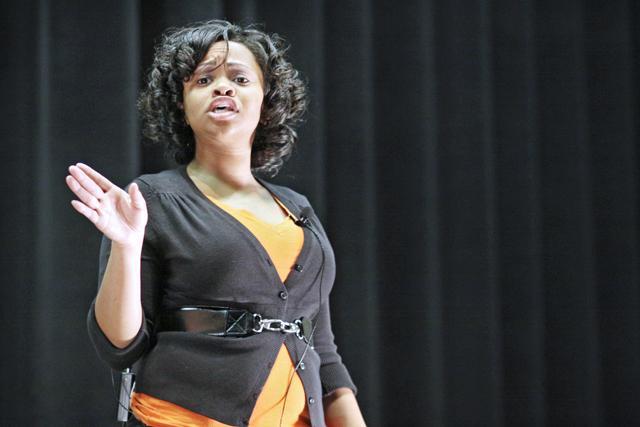On Tuesday nights in Witherspoon Student Center, students can go and see a critically-acclaimed play, something pretty standard on the campus where every week there’s the opportunity to attend an arts event.
But this particular play is much different from most plays that are shown. It promises to not only be entertaining for its audience, but raises awareness of an important issue in our society and allows students to contribute to ending it.
The Vagina Monologues was originally a one-woman show, written and performed by Eve Ensler. Since its first performance in 1994, the show has expanded into an immense worldwide organization that raises awareness of violence against women and girls called V-Day, founded by Ensler.
“The production itself talks about a variety of topics around the idea of being a woman,” said Kathleen Hebert, a senior in extension education and the director of the show.
The point is to use the play to help raise awareness about violence against women and girls and to fundraise to help end the violence.
“Organizations like N.C. State can request rights to the script so that we can perform it ourselves and raise money for various causes that help local women and girls,” Hebert said.
This year, 10 percent of the money raised through the show will go to help women and girls in Haiti as part of V-Day’s Spotlight Campaign, where the group tries to raise worldwide awareness about the violence against a certain group of women and girls.
The other 90 percent will go back to help women of N.C. State through the Women’s Center.
The Women’s Center has been putting on productions of The Vagina Monologues for many years, originally every year, but it was later decided to put the show on every other year. The students involved with the show are trying to move back to performing it every year.
“…[W]e are trying to move it to every year to establish a tradition on campus, kind of like the Chocolate Festival,” Hebert said. “It’s an event that women can look forward to and participate in if they want to.”
Women are encouraged to audition to perform in the play and everyone—women and men—are asked to volunteer backstage. All the women involved had different reasons why they wanted to join in.
Hebert, who also directed the show last year, has been involved in social justice theater throughout her college experience.
“The Vagina Monologues was just the next step in that passion that I have,” Hebert said.
She explained that theater dealing with social issues helps the audience understand the issues better and that is why she thinks it’s important.
“…[T]hat type of theater is really important to me because I think it brings the message home. It asks the audience to actively think about it,” Hebert said.
Morgan Piner, a freshman in marine science and an actress in the performance, said she liked the understanding it tries to bring to the audience about issues they otherwise would not know about it.
“It’s a very diverse show and brings a lot of awareness that people—women or men—don’t know a lot about,” Piner said.
Angela Carter, a graduate assistant at the Woman’s Center, had wanted to be involved since she saw a production of the show as an undergraduate student.
“When I started working with the Women’s Center, I knew it was something that I wanted to get involved with,” Carter said. “It’s something that I believe in.”
The main reason Hebert thinks students should come out and see the show is because they are likely to have an experience different from an average theater show.
“I would encourage everyone on campus to come to this show at some point in their life,” Hebert said. “It’s not ordinary theater at all.”
Piner agrees and assures that the audience will see something that they probably don’t expect.
“It deals with the important issues. It’s very diverse,” Piner said. “You probably will enjoy it. It’s probably not what you think [it is].”
Overall, all the women believe it’s an experience worth having.
“You’ll laugh, you’ll cry, but at the end you walk away with a better understanding of what it means to be a woman — and that’s the point,” Carter said.








